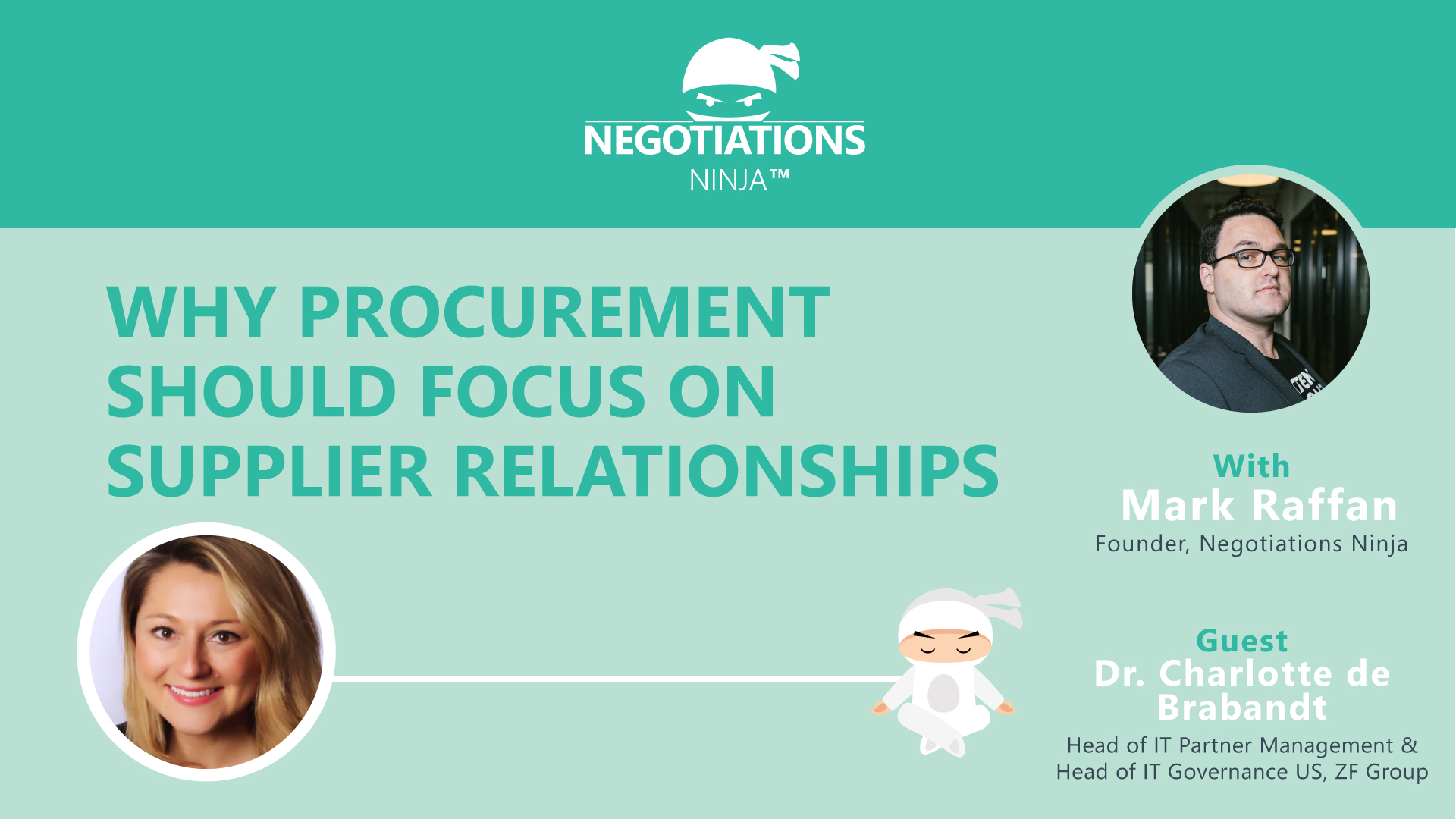Dr. Charlotte de Brabandt has been in procurement for 14 years and worked in five different industries on three different continents. During this time, the world has undergone massive changes—and so has the world of procurement.
The crises we’ve faced have led to a further reliance on technology to navigate supplier negotiations, but it’s also led to a shift in relationships. Procurement needs to move away from impersonal numbers-based negotiations toward collaborations. We actually need to build relationships with vendors to remain competitive.
Charlotte explores this idea—and delves into the future of technology and AI in procurement—in this fascinating episode of Negotiations Ninja.
Outline of This Episode
- [1:35] Learn more about Dr. Charlotte de Brabandt
- [5:55] Embracing changes in communication
- [8:11] Embrace the shift toward supplier relationships
- [15:28] Procurement hinges on relationships
- [17:45] Charlotte’s conversation with Sophia the robot
- [19:49] The future of AI in procurement
- [22:58] The implications of technological advancement
Embracing changes in communication
Every company was forced to go through a massive transformation when Covid turned the world upside down. Everyone had to go digital. But one of the biggest changes procurement had to adopt globally was how to communicate with suppliers.
Procurement suddenly had to collaborate and partner with other companies. Charlotte notes that things have shifted toward communication and clearly identifying one’s roles and responsibilities.
What are your expectations for suppliers? What is required? Technology is helping with IoT, AI, inventory planning, risk management, and more. Your relationships will come down to communication.
Let your objectives inform your strategy
What do you need? You need to define your KPIs and objectives and plan around them. Vet the different suppliers you want to approach. Then you can focus on the negotiation strategy to implement.
When Charlotte was in the automotive industry, she spent time negotiating hundreds of thousands of petrol tanks. In one particular negotiation, she sat at the table with her manager, and no one said anything for over six minutes before the supplier decided to break the silence. You can’t use this strategy in many industries.
When Charlotte worked in Asia, after months of negotiation for a particular deal, she invited the three final suppliers to their office. The suppliers were placed in three separate rooms. Charlotte walked in and asked each of them for their final offers, written on a piece of paper.
They all offered her their business cards. Each time, she left the business card on the table and walked out. One person grabbed the business card and ran after her, which showed her that the business was important to them. Different tactics work for different industries.
Embrace the shift toward supplier relationships
Charlotte once negotiated energy contracts for a global energy service provider with 980 different sites. She worked with a service provider that helped her negotiate for each continent.
She wanted to negotiate with one service provider to extract some savings. She was taking a very different approach than what they were used to. She invited all of the suppliers they worked with (50+) and explained the mission of the company, the purpose of the call, and the objectives. She asked them to speak together and bring her a bundled offer (there’d never been anything like it before).
She collaborated with them and asked for engagement. That’s when she started to think of suppliers as partners. You need to engage them and have conversations to understand them. They need to feel listened to and important. You need to focus on supplier relationships to succeed.
Procurement hinges on supplier relationships
When a crisis hits, who will a supplier give their products to? Is it the person who has always treated them like a number? Someone who has never treated them like a person? Someone who doesn’t listen or understand them? Or is it the person who treats them like a human? We want to be the customer of choice for vendors when a crisis hits.
The industry is transforming. The way we see suppliers is changing. They are someone that we need to rely on. Negotiation is becoming about collaboration. It’s about focusing on human connections and partnerships. It’s about building relationships.
When a crisis hits, how are you going to treat your suppliers? Who are you going to align with? We need to know which suppliers are important, who we can rely on, and who we can build relationships with.
Resources & People Mentioned
Connect with Dr. Charlotte de Brabandt
- Charlotte’s Website
- Connect on LinkedIn
- Subscribe to her YouTube channel
Connect With Mark
- Follow Negotiations Ninja on Twitter: @NegotiationPod
- Connect with Mark on LinkedIn
- Follow Negotiations Ninja on LinkedIn
- Connect on Instagram: @NegotiationPod




